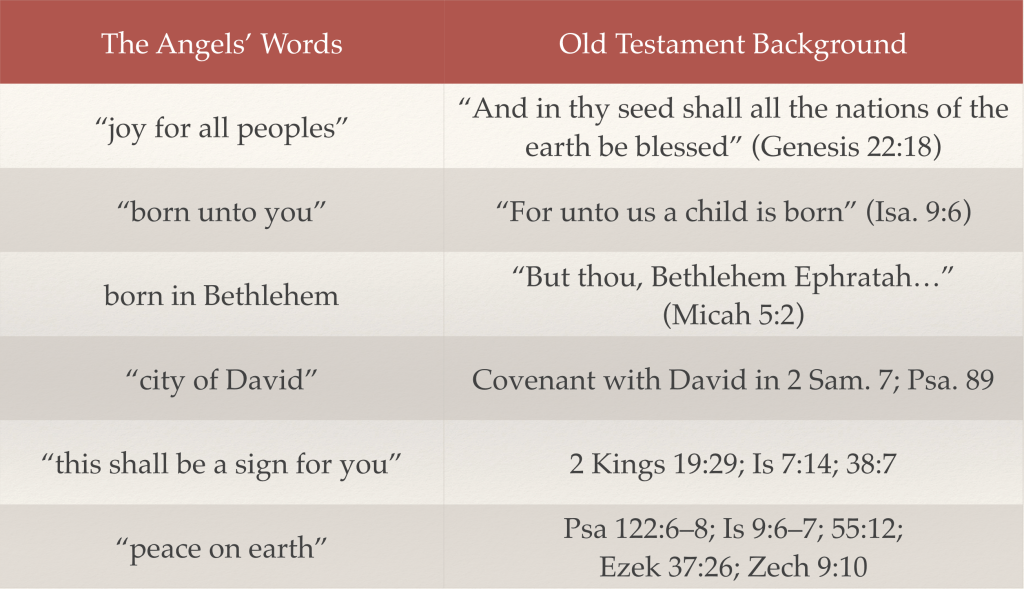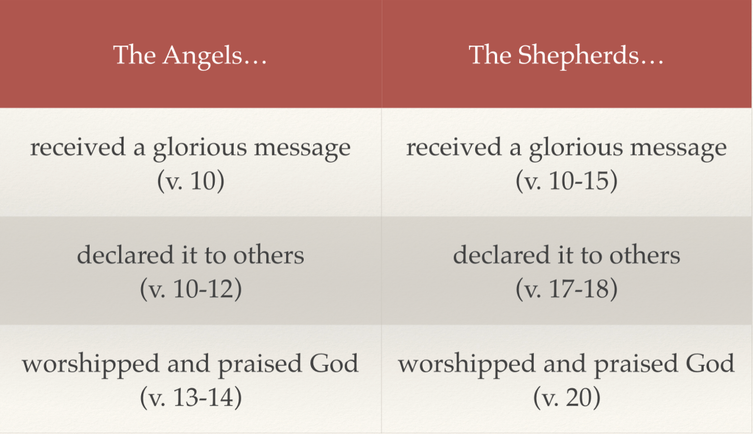|
Dr. Joel Arnold is on the Bible faculty at BJMBC. LUKE 2:8-20 Whatever else we would say about Luke’s story of the angels and the shepherds, it’s definitely memorable. But less clear is the point. Why did it happen? What does it mean? I’m going to argue that there’s something huge going on here. I’m going to argue that this event was a teaser—a short preview of what the Messiah would do. It’s proof that someday people and angels will worship side by side, giving glory to this newborn child. But I’m getting ahead of myself. Angels can worship too.Let’s start by turning the camera around from how we normally view the scene. Why do we always see it completely from the viewpoint of the humans—the shepherds? Look at it not from the view of the men on the ground, but the angels in front of them. Several things come to mind:
Now put that into the grid of what happened here. Angels were there when Satan fell. Angels saw the good creation and man’s subsequent fall into sin. For thousands of years they watched people wallow in the filth and horror of sin. And yet they were also sent to deliver promises—the hope of a redeemer who would finally deliver mankind from death and sin (Gen 18:1–15; Heb 2:2). They worshipped the Son in heaven’s throne room for thousands of years (Dan 7:10). Then, one day, the glorious Son takes flesh and is conceived in the body of a Jewish woman. An angel delivers the news to Mary (Luke 1:26–38). Nine months later, angels are commissioned to share the grand announcement. After millennia of waiting, hoping and watching, the horror of this wicked world will come to an end. The promise has arrived. The Messiah is here. Are these angels dispassionately relaying information like heavenly robots? Or should we not remember Peter’s words that the angels also longed to look into God’s masterful plan? They also marveled and wondered at the Old Testament prophecies about “Christ’s sufferings and the glory to follow” (1 Pet 1:10–12). Take even a cursory look at their words, and you’ll discover that the announcement comes straight from the Old Testament! What are these angels doing? They’re worshipping! They themselves are in awe at what God has starting doing and they can’t help crying out with joy. Shepherds Join the Heavenly WorshipNow consider the shepherds. Classic art, Sunday school papers, and scenic calendars all get it wrong:
To this point in the story we can be shocked by the contrast. A throng of heavenly beings before a few shepherds? A dark, quiet hillside suddenly transformed by blazing light? The angels have come from the grand splendor of heaven and now they stand in the squalor of a sin-sick earth. Heaven Meets EarthAnd yet this contrast—heaven vs. earth—stands at the center of the story. It’s in the poetry that the angels sing. Heaven has been full of glory for thousands of years. Earth has been a horror of sin and its consequences. Until now. Because through the Messiah, at last, peace has come. We discover that this brief interchange on a hillside in Galilee had much more significance than we might think. The angels shared the news, but just as important they also worshipped together with the shepherds. Remember the glory that shone around them? That glory didn’t come from the angels like we assume. Read closer—“the glory of the Lord shone round about them.” For a few minutes, that Galilean hillside became a foretaste of great things to come. For a few minutes, angels and men stood together in awe at the miraculous thing God was doing for planet earth. What’s the Point?One more response awaits. We can notice a pattern in how both the angels and the shepherds responded. Not only did shepherds worship with the angels, but they even responded the same way.
And this pattern becomes an imperative to every reader. You’ve received the message. You’ve heard the good news. The hope of planet earth has finally come. This Christmas season, rejoice in awe together with the angels at what God has done. Tell anyone you can about this salvation that He has sent. And then fall before Him yourself and worship.
0 Comments
Timothy W. Berrey is the Director of Graduate Studies at BJMBC. In 2018, Tim Berrey led the BJMBC Footsteps of John and Paul Study Tour to Turkey and Greece. The following is an excerpt from the Footsteps of John and Paul devotional book. EPHESUSAncient Ephesus was a city dear to both John and Paul. Paul labored here first and, in fact, visited the city on multiple occasions. Even as early as his second missionary journey, when he directed Aquila and Priscilla to take up residence there, he seems to have felt it God’s will for him to minister there at some point in the future. Almost three years of his third missionary journey were devoted to preaching Christ in Ephesus and only the riot in the nearby amphitheater convinced him the time had come for him to move on. However, the “damage” (so to speak) had been done. Before he left, “all Asia had heard the word of the Lord Jesus” (Acts 19:10). Even after he left Ephesus, he remained burdened for the church and wrote them an epistle preserved in our Bibles as his “Letter to the Ephesians.” The courier of his letter was none other than Tychicus, an Asian believer who was probably from Ephesus and likely a convert of the Apostle Paul. Paul’s personal footprint in the city was further extended by the ministry of Timothy, his closest son in the faith, whom he personally requested to help the church to stand against some who were teaching false doctrines (1 Tim. 1:3-4). Church tradition consistently affirms that Ephesus later became the headquarters of the Apostle John’s ministry in the Roman province of Asia, much of which he seems to have traveled, overseeing churches and encouraging believers. Ephesus was home to the Temple of Artemis (Diana), one of the seven wonders of the ancient world. This huge structure was four times the size of the Parthenon in Athens and was revered by many in Asia as the chief place of worship to the goddess Artemis. As Paul, in his letter to the Ephesians, speaks of their spiritual “rags-to-riches” story, he climaxes by pointing out that the church, the “new man” composed of both Jews and Gentiles, is actually being built into a Temple or, in more direct terms, God’s dwelling place. In whom all the building fitly framed together groweth unto an holy temple in the Lord: In whom ye also are builded together for an habitation of God through the Spirit (Ephesians 2:21-22). How ironic this must have been to the Ephesian church. They—not the nearby Temple to Diana—were actually the dwelling place of the one true God and could now experience all of His divine fullness. Of course, one cannot think of Ephesus without thinking of Christ’s words to them in Revelation 2, where He censures their faltering love. Nevertheless I have somewhat against thee, because thou hast left thy first love (Rev. 2:4). Strikingly, almost no other New Testament letter of Paul uses the word “love” more than his letter to the Ephesians. Everything we enjoy as believers is because of God’s love for us (Eph. 2:4). He bestows on us so much grace because of our union with His beloved Son (1:6). Rooted and grounded salvifically in His love, we are to go on to experience the infinite dimensions of Christ’s love for us. That Christ may dwell in your hearts by faith; that ye, being rooted and grounded in love, May be able to comprehend with all saints what is the breadth, and length, and depth, and height; And to know the love of Christ, which passeth knowledge, that ye might be filled with all the fulness of God (Eph. 3:17-19). We are then to mimic God’s love by loving others the way He and His Son have loved us (5:1-2). Paul ends his letter by praying grace upon all those who love the Lord Jesus with an undying love. Grace be with all who have undying love for our Lord Jesus Christ (Eph. 6:24; HCSB). The church at Ephesus evidently triumphed over the false teachers of Timothy’s day, but the resurrected Jesus’ comments spoken to the Apostle John reveal something lacking in their love. His criticism reminds us that one can work hard in His name and hate false teaching but do so without the love that He deserves. Hymn for Meditation: Here is Love (William Rees) Here is love, vast as the ocean, Loving-kindness as the flood, When the Prince of Life, our Ransom, Shed for us His precious blood. Who His love will not remember? Who can cease to sing His praise? He can never be forgotten, Throughout heav’n’s eternal days. On the mount of crucifixion, Fountains opened deep and wide; Through the floodgates of God’s mercy Flowed a vast and gracious tide. Grace and love, like mighty rivers, Poured incessant from above, And heav’n’s peace and perfect justice Kissed a guilty world in love. Let me, all Thy love accepting, Love Thee, ever all my days; Let me seek Thy kingdom only, And my life be to Thy praise; Thou alone shalt be my glory, Nothing in the world I see; Thou hast cleansed and sanctified me, Thou Thyself hast set me free. In Thy truth Thou dost direct me By Thy Spirit through Thy Word; And Thy grace my need is meeting, As I trust in Thee, my Lord. Of Thy fullness Thou art pouring Thy great love and pow’r on me, Without measure, full and boundless, Drawing out my heart to Thee.
Pastor Albert Tiangco pastors Promised Land Baptist Church and teaches theology and language courses at BJMBC. Christians are engaged in a spiritual warfare. Every day is a battle. Often, this non-physical engagement occurs as God’s children face temptation. Believers are enticed to sin relentlessly in this age—the allurement of the world, ubiquitous (1 Jn. 2:15f; Jam. 4:4), the inward seduction by man’s sinful nature, unrelenting (Rom. 6:12f), and the temptations of Satan, attractive (Gen. 3:1ff). The incarnate Son of God experienced such unrelenting temptations, perhaps even to the most potent degree that the Enemy can offer. In each temptation, the Lord Jesus came out victoriously (Heb. 2:17-18). The Lord’s temptations recorded in the Gospels present key principles or truths that can lead every believer to triumph (Mt. 4:1-11; Lk. 4:1-13).
The Holy Spirit led Jesus to be tempted by the devil (Mt. 4:1). The first truth towards triumph is that God has total control over all the temptations we face. Just as Satan won’t be able to tempt the Lord apart from the permission of the Holy Spirit, so the enemy cannot touch us beyond what God has allowed. God will not allow His children to face temptations beyond their ability to resist (1 Cor. 10:13). Since the Lord was led by the Spirit, He was in the center of the will of the Father. This leads to the second truth: Great temptations come even (and perhaps more so!) when one is in the very center of God’s will for his/her life. If you are following God, expect more ferocious enticement to do otherwise. The story of the Lord’s temptation follows the narrative of His baptism in Matthew’s and Luke’s accounts. Christ’s baptism signified the commencement of His public ministry. The temptation, therefore, came just right after He launched into what the Father sent Him to do. He was tempted no less than by Satan himself. This shows that great temptations come when one enters upon service for God or when one has decided to do something for the Lord. It is not a coincidence, therefore, for example, that temptations to be impure come with more appeal and force at the time when one has committed to live a pure life for God. This reminds us that temptations are designed ultimately to render us useless for the Lord; Satan is never really concerned about man’s happiness. The Devil ultimately views each people as means of attacking God. Matthew sets the context of the first temptation: Jesus had just fasted for 40 days and nights and became hungry. Fasting, in the Scripture, is often, if not always, accompanied by prayer. Why did He pray for that long? Perhaps as a preparation for His public ministry and for facing Satan’s temptation. The truth here is that facing temptation is a very serious matter. It is a battle, not a game. We need to totally depend on God for victory. One’s prayer life, then, indicates one’s view of spiritual warfare. It is small wonder that many Christians fail to overcome temptation because many believers fail to prepare for battle by praying for victory. At the height of Christ’s hunger, Satan tempted Him to act independently of the Father’s will and turn stones into bread. Temptations are appealing. If it isn’t, no one will sin. Even in the very first temptation Satan garbed his lies with wisdom by using a wise creature. As one poet has stated, “Not all that glitters is gold.” Believers must not be deceived; hindi kailanman sulit ang magkasala. Satan’s first temptation illustrates that often temptations urge us to meet our legitimate needs through illegitimate means. For instance, it is not wrong to provide for you family, but taking a job that would prevent a believer from regularly taking part of corporate worship is an illegitimate means because it hinders you from obeying a God’s clear mandate. Satan begins his second temptation by quoting Scripture (Mt. 4:6). He was tempting the Lord to presume on God’s care. The next truth is that temptation to sin can also come in a form of misinterpreted and misapplied Scripture. Ironically, sometimes Christians justify their sins by appealing to certain “verses” in the Bible. An extreme example is that some believers argue against the necessity of church attendance by appealing to verses about the indwelling presence of the Holy Spirit—“I have the Holy Spirit and my Bible. I don’t need to go to church.” This reasoning fails to consider other parts of the Bible that mention the importance of corporate meetings (e.g., Heb. 10:25). One’s interpretation or application is wrong when it contradicts a clear Scriptural statement. In the third temptation, Satan bluntly asked the Lord to worship him in exchange for earthly wealth, glory, and power (Mt. 4:8-9). The essence of all temptation is putting self before God and others. There is a sense that all sin is an act of pride and selfishness (cf. Isa. 53:6—“All we like sheep have gone astray...”). The essence of temptation is so much in harmony with what Satan really is all about–coveting the place of God (Isa. 14:13-14). The Lord’s responses to all three different temptations were the same. He achieved victory through God’s Word. The key to victory in times of temptation is Christlikeness: knowing and obeying God’s Word. Treasuring God’s words in our hearts keeps us from sinning (Ps. 119:11). God’s Word is the sword of the Holy Spirit (Eph. 6:17). Believers must fill their minds with God’s Word, specifically, with passages that directly address their current struggles. But equally important is that Christians must be resolved to obey God’s Word. Jesus did not merely quote verses; He obeyed them. by Douglas Bachorik, director of music studies
Recently my family transferred to a new place in Quezon City. In fact, we are living along Maginhawa Street – one of the best food neighborhoods in Metro Manila, maybe even the world! With so many options, the problem we have now is deciding what to eat. While that is a relatively easy thing to decide (we eat at home most of the time) other decisions in life are not so easy, but are important. During the process of unpacking books and papers for my home office/study, I came across a helpful article in my wife’s files. Probably written in the 1970s, it offers simple, biblical help in making decisions about the “gray” areas of life – those activities that God has not directly addressed in the Bible. I hope it will be a help to you in your life and ministry, as it has been to me. QUESTIONABLE THINGS by E. Robert Jordan (1925-2009) Principles to follow: 1. Is it best? I Corinthians 6:12 2. Does it bind? 1 Corinthians 6:12 3. Does it build others? 1 Corinthians 10:23 4. Does it boast in God? 1 Corinthians 10:31 WHAT THE BIBLE SAYS ABOUT QUESTIONABLE THINGS How often have you heard a Christian say, “Can I do this, can I go there, am I allowed to have this?”, and we soon learn as Christians that the Bible does not speak about everything EXPLICITLY, but it does give principles how to govern everything that comes into your life. The Bible is not only written in commandments. “Thou shalt not...” Exodus 20, “Go ye therefore...” Matthew 28:19, 20, “Preach the Word...” II Timothy 4:2, and many other such commandments, the Bible is also written in very explicit principles which govern all of the questionable things that come into our life that are not explicitly governed under a commandment in the Bible. The worldly or carnal have little or no concern at all about obeying the Lord, and even some of the explicit commandments of “thou shalt” and “thou shalt not” do not bother them, let alone the questionable things. They feel that they have a right to do what they want to do and they will do what pleases them. Then, how does a godly, dedicated, “I want to obey God” Christian judge questionable things, whether they are right or wrong? Let me suggest at least eleven principles by which the godly Christian can judge everything that comes into his life. ELEVEN PRINCIPLES FOR BELIEVERS TO JUDGE ALL MATTERS ON QUESTIONABLE THINGS 1. DOES IT MAKE ME LOOK, ACT, OR BE WORDLY? I John 2:15, 16 “Love not the world, neither the things that are in the world. If any man love the world, the love of the Father is not in him. For all that is in the world, the lust of the flesh, and the lust of the eyes, and the pride of life, is not of the Father, but is of the world.” 2. IS THERE ANY DOUBT ABOUT THE THING THAT I WANT TO DO? Romans 14:22, 23 “Hast thou faith? have it to thyself before God. Happy is he that condemneth not himself in that thing which he alloweth. And he that doubteth is damned if he eat, because he eateth not of faith: for whatsoever is not of faith is sin.” 3. AM I BASING IT JUST ON MY FEELINGS? Proverbs 14:12 “There is a way which seemeth right unto a man, but the end thereof are the ways of death.” 4. IS IT ONLY BY MY CONSCIENCE? Titus 1:15 “Unto the pure all things are pure: but unto them that are defiled and unbelieving is nothing pure; but even their mind and conscience is defiled.” 5. DOES IT BUILD ME UP IN THE LORD AND MAKE ME A BETTER BELIEVER? I Corinthians 10:23 “All things are lawful for me, but all things are not expedient: all things are lawful for me, but all things edify not.” 6. COULD IT BE A STUMBLING BLOCK TO OTHER BELIEVERS? Romans 14:13 “Let us not therefore judge one another any more: but judge this rather, that no man put a stumblingblock or an occasion to fall in his brother's way.” 7. WILL IT HARM MY BODY? I Corinthians 6:19, 20 “What? know ye not that your body is the temple of the Holy Ghost which is in you, which ye have of God, and ye are not your own? For ye are bought with a price: therefore glorify God in your body, and in your spirit, which are God's.” 8. DOES IT GLORIFY THE LORD? I Corinthians 10:31 “Whether therefore ye eat, or drink, or whatsoever ye do, do all to the glory of God.” 9. CAN I DO IT IN HIS NAME? Colossians 3:17 “And whatsoever ye do in word or deed, do all in the name of the Lord Jesus, giving thanks to God and the Father by him.” 10. HOW DOES IT APPEAR TO OTHERS? I Thessalonians 5:22 “Abstain from all appearance of evil.” 11. DO I WANT TO REAP THIS IN MY CHILDREN’S LIVES? Ephesians 6:4 “And, ye fathers, provoke not your children to wrath: but bring them up in the nurture and admonition of the Lord.” If you really love the Lord, you will want in every way to be a better Christian and to please the Lord. These principles will, I believe, go a long way in answering questions for you regarding questionable things. [Originally printed and distributed by The Calvary Baptist Press. No copyright or date given. This version contains slight editing. Dr. Jordan was a prominent 20th Century fundamentalist, founding pastor of Calvary Baptist Church, and founder of Calvary Baptist Theological Seminary (now closed), Lansdale, Pennsylvania (USA). The publication of this article does not imply a complete endorsement of those ministries.] Dr. Phil Kamibayashiyama serves as the director of BJMBC and teaches Theology. “The LORD has done great things for us; whereof we are glad” (Psalm 126:3). Ultimately, our joy is in the great deliverance that God has shown to all of us who have claimed Jesus’ cross as our only salvation from sin. We also rejoice in what the Lord is doing in our lives and ministries each day. Below are summer highlights that God’s hand is still powerful to work and save.
After final exams, Matt Herbster and Matt Collier of the Wilds Christian Camp and Camps Abroad taught our commencement module class on “The Youth Camp and Counseling Young People.” Later that weekend, they led a two-day E-Camp (evangelistic camp), using the BJMBC students and alumni as staff and counselors. The Lord answered prayer by giving us over 80 campers (besides 20 counselors and 20 staff) and working in the hearts of 30 unsaved teens to make salvation decisions. 20 more teens made decisions for assurance or spiritual growth. Please pray for God’s guidance regarding making e-camps an ongoing ministry of BJMBC. We would like to have a BJMBC mission team go out each semester for a week to a different area of Luzon. They would train counselors, help the church and its youth in evangelizing, and run an e-camp for unsaved teens. We are also rejoicing in how the LORD has been using the BJMBC students and alumni in church youth camps and DVBS in many places from northern Luzon to Mindanao. For example, one youth camp had 200 campers and many decisions of dedication and daily feeding on God’s Word. The DVBS of churches here in Quezon City not only had good attendance but also definite salvation decisions after the gospel was clearly and thoroughly explained. Praise the Lord for precious souls! Back in early April, fourteen students graduated, seven undergraduate students and seven pastors from the seminary. All are called to the full-time ministry of God’s Word. This is the reason why BJMBC exists: to train soldiers in the battle for truth in a perishing world. We are excited about the subjects we are offering this coming semester, some of which are Practical Christian Growth, Doctrine of the Bible, Doctrine of God, Biblical Philosophy of Music, Major Prophets, Minor Prophets, Separation, Church Planting, Pastoral Theology, Elementary Greek, Ladies Christian Service, Words and Works of Christ, Systematic Theology 3, Future Events, Matthew in Greek, and Congregational Worship. We are asking the Lord to send us faithful men and women to study at BJMBC. The school year begins June 6. We are teaching a weekly Bible study for the construction workers at the new BJMBC building construction site. We are going through key passages in the Bible from Genesis to Revelation. This past Saturday, our focus was the worldwide flood in Genesis 6-9. Genesis 6:5-8 was our main text. Truth #1: The LORD sees that man’s heart is evil (Genesis 6:5; Jeremiah 17:9). Truth #2: The LORD is sad about sin, and He judges man (Genesis 6:6-7; Genesis 7:23-24; Galatians 6:7-8). Truth #3: The LORD shows grace to some and delivers them (Genesis 6:8; Genesis 8:15-17; Ephesians 2:8-9). Truth #4: The LORD promised to never again destroy the earth by flood (Genesis 9:14-15), but someday, God will destroy the earth by fire (2 Pedro 3:10). Praise the LORD for His provision of BJMBC’s first lot and building. This past week they formed the beams for the 3rd floor and will pour the slab on June 1. This is the result of many miracles of God’s provision of funds and God’s deliverance from sinful, unreasonable men. Most of all, we are excited to have a place for training faithful men and women in Asia for the truth of the glory of God in Jesus Christ. God’s hand is not shortened that He cannot save and work powerfully today! By Mr. Doug BachorikA few days ago, a student asked if he could borrow a luggage scale to use as he packs. He will be returning to his home country at the end of the school year, and does not want to pay overweight luggage fees at the airport. After telling him I would bring the scale from home, I quickly forgot all about it. The next day he asked again. This time I put the scale on our dining table so that I could put it in my motorcycle box. Then I left for the Bible college ... and the scale stayed home! Yes, age may be a factor here, but am I the only one who sets reminders on my mobile phone, and still forgets? I doubt it. Forgetting is so easy, but remembering takes work. The Lord, who knows our nature completely, emphasizes the need to remember. In the book of Deuteronomy alone there are 13 commands to remember:
It is important for God’s people to remember, so that we can live fully in the fellowship and blessing of God, grow further into the image of Christ, and be a clear witness of the power of the gospel. Remembering helps us to obey the Lord. So, what are we supposed to remember? And how are we supposed to remember? In a sense, the entire of book of Deuteronomy is one huge memo. It reminded a younger generation of Israelites (those who were unborn or under the age of 20 when the 10 spies brought their evil report of the promised land) of all that God had done. It is a reminder to us of powerful truths. Truths about our Lord. Truths about ourselves. We must never forget that:
And, we must not forget God Himself! Have you ever gone through a day and realized at the end that you had not thought about the Lord? You never asked for His wisdom or guidance, never recognized His hand in some event, never praised Him, or resisted temptation because of His conviction? Although all people who have truly been redeemed do have the Holy Spirit in them, they can still forget God. So, we are commanded to remember our God. Solomon, in concluding his meditation on the uselessness of a life without God, tells us to remember now thy Creator in the days of thy youth. The apostle Peter stated that we can sometimes forget we are even saved! As one friend use to say, we have bad ‘rememberers’. How can we remember? The Lord gives us at least four means of recall in Deuteronomy. RWTS: Read, Write, Talk, Sing. First, the Lord has given us His word to READ. Deuteronomy, and the rest of the Bible, was written to be read: thou shalt read this law before all Israel in their hearing (Deut. 31:9). Daily, attentive reading of God’s word fills our minds with truth, reminding us of who God is, what our relationship to Him is, and what we are to think, say, and do. And these are things we often forget. The more you read God’s word, the more it inhabits your mind, and is used by the Holy Spirit to remind you of important truths at just the moment you need to remember them. Connected to this, of course, is to WRITE. We already know that when we write things down we have a better chance of remembering. The physical act of writing, the thinking, the seeing, the re-seeing of what you wrote – all of this helps you remember. And thou shalt write them upon the posts of thine house, and on thy gates (Deut. 6:9, 11:20). Even the future kings were to write copies of God’s word: ... he shall write him a copy of this law in a book (Deut. 17:18). Write verses from your daily Bible reading into your planner, or on an index card, or in a journal – that will help you remember the truth you learned. Keeping a prayer journal where you list your prayer requests, and then enter God’s answer, continually serves as a reminder that God hears and answers prayer. Have you ever noticed that when you ask someone to help you remember something, you usually remember it without their help? TALK will help you remember. Deuteronomy 11:18-19 emphasizes the importance of talking – in the home, in public worship, every day, everywhere. Tell someone something true about God, and you will remember it better yourself.  Lastly, SING! Did you notice the huge song near the end of Deuteronomy? In chapter 31 (verses 19 and 21), the Lord commanded Moses to write and teach a song to Israel. As the Jews sang it, they would remember everything else in the law. Singing is a unique and powerful way to drive information into our very being. God commanded that we sing so that the word of Christ can dwell in us richly (Col. 3:16). Recently, BJMBC musicians and several church choirs spent months practicing choruses from Handel’s MESSIAH. Now, all of us are hearing in our minds the glorious truths of Christ’s first coming, His sacrifice, and his future, glorious return. These truths will not ever leave us.
I started out by saying that remembering is hard and forgetting is easy. Maybe remembering is not so hard after all. God told us to remember and He told us how. Just remember: RWTS! From Dr. Ina Bunyi: A former Bible Clubber’s tribute to her modern day heroes of faith.
In His Sovereignty God knew I would need to know Christ as my Savior early in life and used this loving couple's compassion and burden for the souls of neighborhood kids to make sure I did. It was during one of those Saturday Bible Clubs when I heard about the Savior’s love for me and accepted His gift of everlasting life. “For God so loved the world, that he gave his only begotten Son, that whosoever believeth in him should not perish, but have everlasting life” (John 3:16). “Whosoever” surely meaneth me, surely meaneth me Oh surely meaneth me! “Whosoever” surely meaneth me – “whosoever” meaneth me!! Who can resist such a gift that included me? I am very thankful God gave me wisdom not to! In 2007 (30 years after I last saw them) God allowed me to visit the Hufstetlers and to personally thank them for being my spiritual parents. I am indebted to the people God used for the blessed reunion where once more I saw Uncle Chuck's mischievous grin and enjoyed (my favorite) Mom Jo's cookies that I too now prepare and share on occasion to Bible clubbers in the neighborhood where I now live. It was during this time that I learned that before I met them, they were ready to retire from their work in Marinduque (another province) in order to take charge of another work in the States, but God sent them on a "detour to Manila." I know now I was one of the reasons why. Uncle Chuck and Mom Jo were a couple who let the light of God's love so shine (Matthew 5:16) before others that they saw God in all their good works, heard Him in their words, and even in their silence when they knew speaking out their mind may not be of help or may offend. I am only one of those many children (in the early 70s) and adults (this past decade when we were reunited) who benefited from their godly light. In their eyes I saw His care I could see His love was there They have been so faithful And I saw Jesus in their lives Mr Ron Hamilton's "I Saw Jesus In You" rephrased They knew that as much as they did it to the least of my brethren (Matthew 25:40), including tiny Filipino kids, they were doing it for the Lord! To love unconditionally and non-selectively...to prefer God's will over their own is a great blessing and challenge to me. For years, even to the very end of conscious life they prayed for my husband Dan and me. If they knew you and your need, I am sure they prayed for you too. I will eternally be grateful God sent Uncle Chuck and Mom Jo so that I would get to know about the love of Him who sent Christ His Son on the cross so that whosoever, including you and me, would believe on Him would not perish but have everlasting life! How can I repay them and God for their loving kindness? It is not the "sacrifice" of a written tribute nor a well meant recording of a song that I sent for her Memorial Service (made possible through the kindness of friends) that pleases God but of a life that is broken anew and made contrite by the example of this well loved couple who were themselves only fired up by God's everlasting and sacrificial love. The light, in Mom Jo's corner where I belonged, was dimmed by her recent home going (and that of Uncle Chuck in 2009). If I am really thankful, I can pay their goodness forward to others by doing my best, through His strength and for His glory, to brighten the corner where I am. Will you pray with and join me as I ask God's help to see beyond myself a world that is lost in the darkness of sin and in need of our little lights to shine brightly in our corners so that they may through us see the greater Light of the Savior. I Saw Jesus in You
by: Ron and Shelly Hamilton When I enter heaven's glory And I see my Saviour's face, I will offer Him ten thousand years of praise. Then I'll find that special one In whose life I saw God's Son, And through tears of joy with trembling lips these words I'll say: I saw Jesus in you, I saw Jesus in you, I could hear His voice in the words you said- I saw Jesus in you, In your eyes I saw His care, I could see His love was there, You were faithful, And I saw Jesus in you When I stand before my Father To receive my life's reward, And my soul is bathed in God's eternal day When this race on earth is run, And God sees the works I've done, More than anything I long to hear my Father say: I saw Jesus in you, I saw Jesus in you, I could hear His voice in the words you said- I saw Jesus in you, In your eyes I saw His care, I could see His love was there, You were faithful, And I saw Jesus in you by Dr. Joel Arnold, Faculty in BibleIt sounded plausible at the time. “Hey honey, why don’t I just take the boys over there and get them a treat, while you’re checking out” I said naively one day in a crowded Manila mall. “It’ll give Zach a chance to run.” Sounds great. No problem. I got this one. Actually, all things considered, he did reasonably well. Zach at that point understood “come” and a decent majority of the time he obeyed. But 18 months is still 18 months. And in my son’s case that’s a really fast version of 18 months. He always obeyed when I told him to come but the shiny displays and fancy flashing lights were just too much for his attention span. Our trajectory looked something like this: And that reminded me of biblical thinking. Ok, give me a chance and I’ll make the connection. I’m regularly shocked by the things that get called biblical. I’ve read people arguing that biblical thinking tells us (no joke) we should not be seeking, striving, and working to be more righteous. I regularly read comments claiming to be biblical on topics that have absolutely nothing to do with the Bible. And I’ve had people call specific wording unbiblical that actually turned out to be exact quotations of the Bible. If the Bible isn’t biblical, nothing is. I think this kind of confusion happens because we throw the word around like a hashtag. The positivist philosopher A.J. Ayer once suggested (wrongly) that morals are just our way of giving approval or censure. To him, the statement “stealing is wrong” just means “Stealing: Boo!” or morals meaning “Faithfulness: Hurray!” And for too many believers that’s how “biblical / unbiblical” works too. To say “X, Y or Z is unbiblical” is to say “X, Y or Z: Boo!” Or putting it another way, we’re already pretty sure we’re right, so we try to pull the Bible in on our side. And the problem, of course, is that the ideas just come from our own brains, not the Bible. I’m afraid, sometimes, that because whole generations of us grew up knowing all the Bible stories backwards and forwards, we go into life with the unspoken assumption that “if I’m pretty sure it’s right, it’s biblical.” But in reality, whether I think something is true or whether it even sounds really Bibleish is completely irrelevant; what matters is if it accurately represents the truth of the eternal God. Consider three foundational notions for biblical thinking:
Every morning you get up and walk out the door to a world that is anything but neutral. All day it’s shouting in your ear. All day, a very much fallen part of your heart answers to that call and loves it. And only by actively fighting back will your thinking stay on track. Coming home and opening your Bible is the start of setting things straight again—correcting thoughts that went astray and restoring your thoughts back to the life-giving standard of truth. As it turns out, that 18-month old running through the mall is me. 18-month olds don’t end up anywhere good without someone walking in front, constantly telling them which way to go. If I stop actively, obediently listening to the voice in front of me, I’ll last about 6 steps on my own before I’m headed off to the nearest blinking light or shiny looking package. I’ll probably even figure out a way to slap on the biblical label and call everything else erroneous or too liberal or too legalistic. Or a combination of all three at the same time. Biblical thinking doesn’t just happen. It’s always a miracle, starting with the resurrection of a heart that was dead in sin, and continuing lifelong by the corrective power of the Word of God. Or to put it even more biblically: “We all, with unveiled face, beholding the glory of the Lord,
are being transformed into the same image from one degree of glory to another. For this comes from the Lord who is the Spirit” (2 Cor. 3:18). Wise spiritual mentors heed the example of the master mentor, the Lord Jesus Christ. The Gospels’ records concerning the Lord’s preparation of the Twelve Apostles provide many valuable principles on how to help people mature in faith and be prepared for a life of service. This article discusses two such principles.
Focus on the Heart Throughout His earthly ministry, the Lord primarily addressed people’s hearts. His Sermon on the Mount radiates with emphasis concerning the internal aspects of human life (Mt. 5-7).[1] Christ taught His disciples that the heart is the fountainhead of “evil thoughts” and all kinds of sin. What is in the heart will eventually become manifest in life-defiling actions (Mt. 15:19-20). In several instances, Jesus denounced the hypocrisy of the Scribes and Pharisees before His disciples (Mt. 15:1ff; 23:1ff; Lk. 11:37ff; 12:1). He also affirmed that the two great commands were to love God and man (Mt. 22:37-40). Christ warned against covetousness (Lk. 12:1, 14-15). Ministerial competence—theological knowledge and practical effectiveness—must not satisfy pastor-mentors. They must ever aim for the heart, seeking to cultivate love for God and man, and integrity in the lives of ministerial students. Emphasize Scripture-Based Life and Ministry The Lord Jesus prepared His disciples in a manner that emphasized living and ministering according to God’s Word and will. As the gospel accounts confirm, He exhibited an exceedingly high view of Scripture and the Father’s will. Christ taught that the Word of God always takes priority in importance and authority over man’s traditions and commandments (Mt. 15:3, 9). He also instructed them concerning the necessity of possessing a right kind of heart—one that is “honest and good” when receiving God’s Word (Lk. 8:4ff; Mt. 13:3ff); lives are changed only when one shows an appropriate response to divine revelation. For the Lord, hearing and keeping God’s Word is a more blessed condition than Mary’s privilege to be an instrument in bearing the Messiah (Lk. 11:27-28). Christ viewed the fulfillment of God’s Word and will as necessary (Jn. 9:4). The Lord’s firm obedience to drink the cup of suffering demonstrated His utter commitment to the will of the Father. The Lord’s commitment to God’s Word and will affected all the facets of His earthly ministry. For instance, divine revelation and the Father’s will dictated Christ’s goals and purposes. His meat was doing the Father’s will (Jn. 4:34). He remained faithful to His mission to preach the kingdom of God (Mk. 1:38; Lk. 4:43). He came down from heaven not to do His own will but the will of the Father (Jn. 6:38). What Christ accomplished on earth was the work which the Father had given Him to do (Jn. 17:3). Christ’s pursuit of God’s revelation and will also determined His actions. He kept the Father’s sayings. In a remarkable statement, the Lord said, “I do always those things that please [the Father]” (Jn. 8:29). By the Lord’s ministry, the Father did His work (Jn. 14:10). “As the Father gave Me commandment, even so I do,” Jesus said (Jn. 14:31). In addition to His purposes and actions, Jesus’ message was also permeated with Scripture and submission to the Father’s will. He said, “My doctrine is not mine, but His that sent Me” (Jn. 7:16-18). “As [His] Father hath taught [him],” the Lord Jesus spake “these things” (Jn. 8:28). He uttered that which He had seen with His Father (Jn. 8:38). Additionally, He said that the Father “gave me a commandment, what I should say, and what I should speak” (Jn. 12:49). He did not speak from His own initiative and authority (Jn. 14:10). Pastors must instill in the hearts of future pastors the priority of God’s Word for life and ministry. Ministerial students must understand that Christian ministry is essentially a ministry of the word, a kind of endeavor that must be completely governed by Scriptures. Obviously, this aspect of mentoring can be done only by pastors who are practicing Biblicists. It is a sobering reality that the level of commitment to Scriptures in current ministers will have a significant effect on the ministry philosophy and practice of succeeding generations of pastors. [1] For instance, He put the spotlight on the internal motives underlying the sinful acts of murder and adultery (Mt. 5;21-22, 27-28). He instructed His listeners not perform any righteous deeds for the purpose of being seen by men (Mt. 6:1ff). If the heart is right, good works will follow (Mt. 6:22-23). Matthew Henry, Commentary on the Whole Bible, vol. 5 (Matthew to John) (Grand Rapids: Christian Classics Ethereal Library, n.d.), 150. A good heart “bringeth forth that which is good;” and evil heart produces evil deeds. From “the abundance of [one’s] heart the mouth speaks” (Lk. 6:45). by Mr. Douglas BachorikLife is filled with many activities. Some we choose, some are chosen for us, others just find their way into our lives. Sometimes we don’t even know what we should do, because we feel pulled in so many directions. When that happens, it is time to stop and ask ourselves – what does the Lord expect us to do? The Lord has many expectations of us, and we can find a summary of them in passages like Matt. 23:23. Woe unto you, scribes and Pharisees, hypocrites! for ye pay tithe of mint and anise and cummin, and have omitted the weightier matters of the law, judgment, mercy, and faith: these ought ye to have done, and not to leave the other undone. This echoes Micah 6:8: He hath shewed thee, O man, what is good; and what doth the LORD require of thee, but to do justly, and to love mercy, and to walk humbly with thy God? which echoes Deut. 10:12-13: And now, Israel, what doth the LORD thy God require of thee, but to fear the LORD thy God, to walk in all his ways, and to love him, and to serve the LORD thy God with all thy heart and with all thy soul, to keep the commandments of the LORD, and his statutes, which I command thee this day for thy good? But what, specifically, does God want me to do, today? And tomorrow? One of the best places to look is Revelation 2 & 3, where the Lord Jesus Christ clearly states what is important in the life of a church, and in the lives of believers. He makes 55 commands and commendations, and He criticizes 9 activities. We can organize them into the following 8 ideas - the ‘Revelation list’:
What a glorious calling each one of us has in the Lord – and this has nothing to do with what kind of job you have. These activities are not just for pastors, church workers, or missionaries. They are for all Christians! When we look at this list, what we see is that we are called to be consumed by our relationship to our Saviour. The Lord Himself told us this in Matthew 22:37: Jesus said unto him, Thou shalt love the Lord thy God with all thy heart, and with all thy soul, and with all thy mind. Think of something that has consumed or obsessed you in the past. Every waking minute it’s on your mind. You make decisions about your day, your work, based upon the object of your obsession; if it is a person you even start thinking things like – ‘how does he like my hair’ or ‘what is her favorite flower’ or ‘he likes this kind of food so I will learn how to cook it’ or ‘she likes to do this, so I like that too’. We are supposed to be obsessed with God!
Can I suggest you keep a weekly spiritual log to help you see what you are doing? Think of it as a way to do #8 – examining yourself to see if you are on track with the other 7 items on the Revelation list. Each week answer these questions:
Remember, many demands crowd into our lives. If we are going to do the things the Lord wants us to do, we probably need to leave some things out of our busy days. Your list of ‘droppable’ activities and expectations will be as good as mine! Facebook, Internet games, surfing or online chatting, constant texting, often staying up very late at night, just sitting around, videos and TV… What should be on your “To Drop” list? As you look at the year before you, don’t you think it would be great to fill it with the things God wants you to do? Activities that will ultimately bring glory to Him, and make you more like Him in this life, while you wait for Him to take you home. |
BJMBCReading, learning, growing. God calls us to be changed through His Word. At BJMBC, our goal is to speak truthfully and clearly about that Word, while we prepare a future generation of students to proclaim it. Archives
August 2020
Categories
All
|
|
Bob Jones Memorial Bible College, 2018
|
125 Matahimik Street, Barangay Central, Diliman, Quezon City, Philippines, 1100
|

















 RSS Feed
RSS Feed